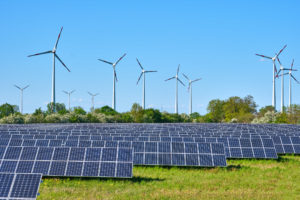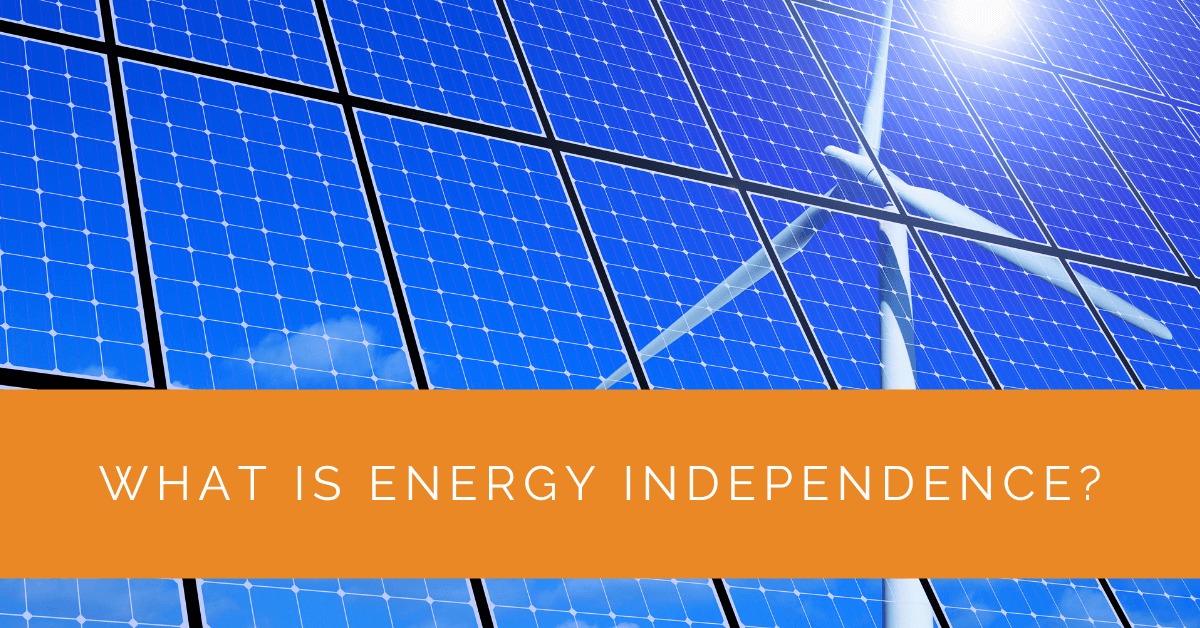Energy independence is a critical goal for nations seeking sustainable energy solutions. In this article, we delve into the concept of energy independence, exploring its significance, the factors influencing it, and the role of renewable energy sources, particularly solar power, in achieving this goal.
Contents
- 1 Key Takeaways
- 2 Understanding Energy Independence
- 3 Factors Influencing Energy Independence
- 4 The Role of Renewable Energy
- 5 Case Study: Achieving Energy Independence with Solar Power
- 6 Expert Insights From Our Solar Panel Installers About Energy Independence
- 7 Experience Solar Excellence with Us!
- 8 Conclusion
- 9 FAQ
Key Takeaways
- Energy independence involves reducing reliance on energy imports and increasing domestic energy production.
- The United States has made progress in becoming energy independent, shifting from heavy crude oil imports to increased domestic production.
- Renewable energy, particularly solar power, is crucial in achieving energy independence by reducing dependence on fossil fuel imports and promoting a sustainable energy future.
Understanding Energy Independence
What is Energy Independence?
Energy independence refers to the ability of a nation to meet its energy needs without relying heavily on energy imports. It signifies a transition towards a self-sufficient energy system that minimizes vulnerability to global energy markets and ensures greater control over energy resources. Energy independence involves diversifying energy sources, optimizing domestic energy production, and implementing efficient energy practices.
The Significance of Energy Independence
Energy independence profoundly impacts a nation’s economic stability, national security, and environmental sustainability. By reducing dependence on energy imports, a country can enhance its energy security, mitigate the impact of global energy price fluctuations, and foster domestic economic growth. Moreover, energy independence allows nations greater control over their energy resources, reducing exposure to geopolitical tensions and disruptions in the global energy market.
Factors Influencing Energy Independence
Domestic Energy Production: A Key Driver
Increasing domestic energy production is a critical factor in achieving energy independence. The United States has experienced a remarkable transformation in recent years, transitioning from a significant crude oil importer to a prominent producer of oil and natural gas. This shift has played a pivotal role in reducing reliance on foreign energy sources. To further enhance domestic production, investments in technological advancements, such as hydraulic fracturing (fracking) and horizontal drilling techniques, have unlocked vast shale gas and oil reserves, strengthening the nation’s energy independence.
Diversification of Energy Sources
While progress has been made in domestic energy production, true energy independence requires a diversified energy portfolio. Relying solely on a single energy source can leave a country vulnerable to supply disruptions, price fluctuations, and resource depletion. Therefore, embracing a mix of energy sources is essential for a resilient and self-sufficient energy system. The United States, for instance, has recognized the importance of diversification by promoting the development of renewable energy sources, such as wind, solar, hydroelectric, and geothermal power. Countries can ensure a reliable and sustainable energy supply by harnessing the power of these renewable sources alongside traditional fossil fuels and nuclear power.
Energy Efficiency and Conservation
Another crucial aspect of energy independence is improving energy efficiency and conservation practices. Energy efficiency measures involve reducing the energy needed to perform specific tasks through technological advancements, improved building codes, and consumer behavior changes. Conversely, conservation focuses on optimizing energy use by eliminating waste and employing responsible energy consumption practices. By prioritizing energy efficiency and conservation, nations can effectively reduce their energy demand, optimize resource utilization, and enhance energy self-sufficiency.

The Role of Renewable Energy
Embracing the Power of Renewable Sources
Renewable energy sources play an integral role in achieving energy independence: Solar, wind, hydroelectric, and geothermal energy offer clean, sustainable alternatives to fossil fuels. Solar power, in particular, has emerged as a prominent player in the renewable energy landscape. Photovoltaic (PV) systems, composed of solar panels, convert sunlight directly into electricity, providing an abundant and environmentally friendly energy source. The scalability and versatility of solar power make it an attractive option for countries aiming to diversify their energy mix and reduce dependence on finite resources.
Advantages of Renewable Energy Adoption
Beyond their contribution to energy independence, renewable energy sources offer many benefits. They significantly reduce greenhouse gas emissions, mitigate climate change, improve air quality, and create new job opportunities in the clean energy sector. Moreover, by embracing renewables, countries can foster innovation, strengthen energy resilience, and establish themselves as leaders in the global transition toward a low-carbon economy. The renewable energy sector also provides economic advantages, such as localized energy production, reduced reliance on imported fuels, and increased energy price stability.
Enabling a Sustainable Energy Future
Renewable energy policies and initiatives play a pivotal role in promoting the adoption of clean energy technologies. Governments worldwide are implementing supportive measures, such as financial incentives, tax credits, and regulatory frameworks, to accelerate the deployment of renewables. Collaborations between public and private sectors and research and development investments are vital for advancing renewable energy innovation and driving the transition towards a sustainable energy future. To fully realize the potential of renewable energy, it is crucial to invest in research to improve efficiency, storage capabilities, and grid integration technologies.
Remember, energy independence is not a destination but a continuous pursuit. By prioritizing domestic energy production, diversifying energy sources, and embracing renewable energy technologies, nations can forge a path towards a more secure, sustainable, and resilient energy future.
Case Study: Achieving Energy Independence with Solar Power
Background
At Solar Panels Network USA, we have been at the forefront of promoting energy independence through the adoption of solar energy. This case study highlights how a community transitioned towards energy independence by leveraging solar power and implementing energy efficiency measures.
Project Overview
Our client, a residential community in California, aimed to reduce its dependence on external energy sources and achieve energy independence. The goal was to implement a comprehensive solar power system complemented by energy efficiency initiatives to create a self-sufficient energy environment.
Implementation
Initial Consultation and Assessment
We began with an in-depth consultation to understand the community’s energy needs and goals. Our team conducted a thorough site assessment, evaluating the potential for solar energy generation and identifying areas for energy efficiency improvements.
Designing a Comprehensive Solar Solution
Based on the assessment, we designed a customized solar power system for the community. The design included high-efficiency solar panels strategically placed to maximize sunlight exposure. We also incorporated energy storage solutions to ensure a reliable power supply during periods of low solar generation.
Integrating Energy Efficiency Measures
To complement the solar power system, we implemented various energy efficiency measures. These included upgrading insulation, sealing air leaks, and installing energy-efficient appliances and lighting. Additionally, we provided residents with guidelines on energy conservation practices to optimize energy usage.
Installation and Optimization
Our experienced installation team executed the project with precision. The solar panels were installed with optimal orientation and tilt to capture maximum sunlight. Energy storage systems were integrated to store excess energy for use during nighttime or cloudy days. Regular monitoring systems were also set up to track energy production and consumption.
Results
Enhanced Energy Independence
The community achieved a significant reduction in energy imports, relying primarily on the solar power system for their electricity needs. The combination of solar energy generation and energy efficiency measures resulted in a self-sufficient energy environment.
Substantial Energy Savings
Residents experienced substantial energy savings, with reduced electricity bills and lower dependence on external energy sources. The community’s investment in solar power and energy efficiency paid off through long-term financial benefits and energy security.
Positive Environmental Impact
By transitioning to solar power, the community significantly reduced its carbon footprint. The use of renewable energy sources contributed to lower greenhouse gas emissions, promoting a cleaner and healthier environment.
Summary
This case study demonstrates the effectiveness of combining solar power with energy efficiency measures to achieve energy independence. Solar Panels Network USA provided a comprehensive solution that not only reduced the community’s reliance on external energy sources but also promoted sustainability and energy savings. The community’s journey towards energy independence highlights the potential for renewable energy to transform energy systems and enhance self-sufficiency.
Expert Insights From Our Solar Panel Installers About Energy Independence
Achieving energy independence involves a comprehensive approach that includes increasing domestic energy production and embracing renewable energy sources. Solar power plays a pivotal role in reducing reliance on fossil fuels and enhancing energy security.
Senior Solar Engineer
Diversifying our energy mix is crucial for true energy independence. By integrating solar power with other renewable sources, we can create a resilient and sustainable energy system that withstands global market fluctuations.
Lead Solar Installer
Energy efficiency and conservation are key components of energy independence. By optimizing energy use and reducing waste, we can make significant strides towards a self-sufficient energy future.
Solar Energy Consultant
Experience Solar Excellence with Us!
Trust in Solar Panels Network USA, where our seasoned experts deliver top-quality solar solutions for homes and businesses nationwide. With a legacy of countless successful installations and a commitment to sustainable energy, we’re your reliable partner in the solar journey. Ready for a brighter, eco-friendly future? Call us now at (855) 427-0058 and harness the power of the sun!
Conclusion
Energy independence is a vital objective for nations seeking sustainable energy futures. The US has made significant progress in reducing energy imports and becoming a net exporter of petroleum products. However, continued efforts to diversify energy sources, promote renewable energy adoption, and invest in research and development are necessary to achieve long-term energy independence.
By embracing renewable energy, particularly solar power, nations can reduce their reliance on fossil fuel imports, enhance energy security, and contribute to a greener, more sustainable global energy landscape.
FAQ
Why is energy independence important?
Energy independence is important for several reasons:
- Energy security: By reducing dependence on energy imports, nations can enhance their security, ensuring a reliable and resilient energy supply.
- Economic stability: Energy independence reduces exposure to global energy price fluctuations, providing stability and fostering economic growth.
- Environmental sustainability: Diversifying energy sources and embracing renewable energy reduces greenhouse gas emissions, mitigates climate change, and promotes a cleaner and healthier environment.
What does an energy independent home mean?
An energy independent home, also known as a net-zero energy home, produces as much energy as it consumes over a given period. It typically utilizes renewable energy sources, such as solar panels, to generate electricity and employs energy-efficient measures to minimize energy consumption. The goal is to balance energy generation and usage, resulting in a self-sufficient and sustainable home.
How can I be energy independent at home?
Achieving energy independence at home involves the following steps:
- Invest in renewable energy: Install solar panels or other renewable energy systems to generate clean electricity.
- Improve energy efficiency: Upgrade insulation, seal air leaks, and use energy-efficient appliances and lighting to reduce energy consumption.
- Energy storage: Consider implementing energy storage solutions, such as batteries, to store excess energy generated by renewable sources for use during low production periods.
- Monitor and manage energy usage: Install energy monitoring systems to track energy consumption, identify areas of improvement, and make informed decisions about energy usage habits.
- Lifestyle changes: Adopt energy-conscious habits, such as turning off lights when not in use, using energy-saving modes on devices, and utilizing natural lighting and ventilation when possible.
By combining renewable energy generation, efficient energy usage, and smart energy management, homeowners can work towards achieving energy independence and contribute to a more sustainable future.
About the Author
Solar Panels Network USA stands at the forefront of solar energy solutions, driven by a team of seasoned solar engineers and energy consultants. With over decades of experience in delivering high-quality solar installations and maintenance, we are committed to promoting sustainable energy through customer-centric, tailored solutions. Our articles reflect this commitment, crafted collaboratively by experts to provide accurate, up-to-date insights into solar technology, ensuring our readers are well-informed and empowered in their solar energy decisions.

